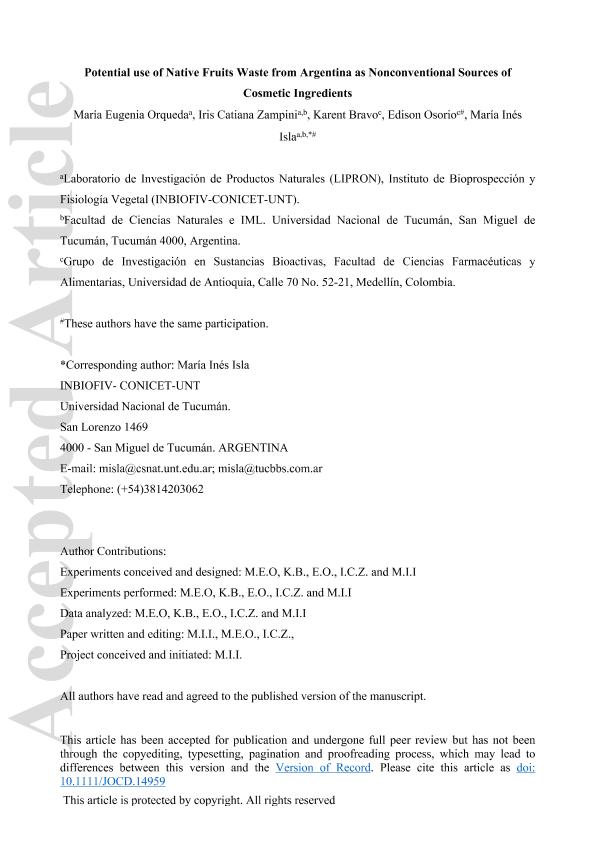Mostrar el registro sencillo del ítem
dc.contributor.author
Orqueda, Maria Eugenia

dc.contributor.author
Zampini, Iris Catiana

dc.contributor.author
Bravo, Karent
dc.contributor.author
Osorio, Edison
dc.contributor.author
Isla, Maria Ines

dc.date.available
2023-10-30T11:51:13Z
dc.date.issued
2022-04
dc.identifier.citation
Orqueda, Maria Eugenia; Zampini, Iris Catiana; Bravo, Karent; Osorio, Edison; Isla, Maria Ines; Potential use of Native Fruits Waste from Argentina as Nonconventional Sources of Cosmetic Ingredients; Wiley; Journal of Cosmetic Dermatology; 21; 10; 4-2022; 5058-5065
dc.identifier.issn
1473-2130
dc.identifier.uri
http://hdl.handle.net/11336/216330
dc.description.abstract
Background: Collagenase, hyaluronidase, elastase, and tyrosinase enzymes are overexpressed and overactive in the skin aging process and hydrolyze the components of the dermal extracellular matrix (ECM) of the skin; these enzymes produce the clinical framework of aging, which includes skin dryness, hyperpigmentation, wrinkles, and inelasticity. Aims: The aim of this study was to explore the potential use of waste from two Argentine native fruits, namely Ziziphus mistol, and red and orange varieties of Solanum betaceum, as sources of bioactive compounds. Methods: Phenolic enriched extracts (PEE) from waste of Z. mistol and S. betaceum were obtained, and their total contents of phenolics and flavonoids were evaluated. The bioactive properties of the extracts were analyzed by measuring their antioxidant capacity and the inhibitory activity on collagenase, hyaluronidase, elastase, and tyrosinase enzymes. Results: The increased ability to inhibit the collagenase was demonstrated by the PEE of Z. mistol seeds and peel, while the enzyme elastase was mostly inhibited by extracts of S. betaceum skin. Z. mistol seed extract was the most active to inhibit hyaluronidase, reaching 96% inhibition at a concentration of 100 μg GAE/mL. The most active extracts to inhibit the tyrosinase enzyme were obtained from the peel of two varieties of chilto fruits, orange and red, and the mistol seed. Conclusions: The results obtained suggest that Z. mistol and S. betaceum waste may be considered as a source of bioactive phenolics. Here, Argentine native fruits waste is presented as a most promising alternative in cosmetic products, with future uses such as hydrogels, creams, or lotions.
dc.format
application/pdf
dc.language.iso
eng
dc.publisher
Wiley

dc.rights
info:eu-repo/semantics/openAccess
dc.rights.uri
https://creativecommons.org/licenses/by-nc-sa/2.5/ar/
dc.subject
ANTI-ELASTASE, ANTI-COLLAGENASE
dc.subject
ANTI-TYROSINASE, ANTI-HYALURONIDASE
dc.subject
SOLANUM BETACEUM
dc.subject
ZIZIPHUS MISTOL
dc.subject.classification
Otros Tópicos Biológicos

dc.subject.classification
Ciencias Biológicas

dc.subject.classification
CIENCIAS NATURALES Y EXACTAS

dc.title
Potential use of Native Fruits Waste from Argentina as Nonconventional Sources of Cosmetic Ingredients
dc.type
info:eu-repo/semantics/article
dc.type
info:ar-repo/semantics/artículo
dc.type
info:eu-repo/semantics/publishedVersion
dc.date.updated
2023-10-27T16:21:07Z
dc.identifier.eissn
1473-2165
dc.journal.volume
21
dc.journal.number
10
dc.journal.pagination
5058-5065
dc.journal.pais
Estados Unidos

dc.journal.ciudad
Virginia
dc.description.fil
Fil: Orqueda, Maria Eugenia. Universidad Nacional de Tucumán. Instituto de Bioprospección y Fisiología Vegetal. Consejo Nacional de Investigaciones Científicas y Técnicas. Centro Científico Tecnológico Conicet Noa Sur. Instituto de Bioprospección y Fisiología Vegetal; Argentina
dc.description.fil
Fil: Zampini, Iris Catiana. Universidad Nacional de Tucumán. Instituto de Bioprospección y Fisiología Vegetal. Consejo Nacional de Investigaciones Científicas y Técnicas. Centro Científico Tecnológico Conicet Noa Sur. Instituto de Bioprospección y Fisiología Vegetal; Argentina
dc.description.fil
Fil: Bravo, Karent. Universidad de Antioquia; Colombia
dc.description.fil
Fil: Osorio, Edison. Universidad Nacional de Tucumán; Argentina
dc.description.fil
Fil: Isla, Maria Ines. Universidad Nacional de Tucumán. Instituto de Bioprospección y Fisiología Vegetal. Consejo Nacional de Investigaciones Científicas y Técnicas. Centro Científico Tecnológico Conicet Noa Sur. Instituto de Bioprospección y Fisiología Vegetal; Argentina
dc.journal.title
Journal of Cosmetic Dermatology
dc.relation.alternativeid
info:eu-repo/semantics/altIdentifier/url/https://onlinelibrary.wiley.com/doi/10.1111/jocd.14959
dc.relation.alternativeid
info:eu-repo/semantics/altIdentifier/doi/http://dx.doi.org/10.1111/jocd.14959
Archivos asociados
